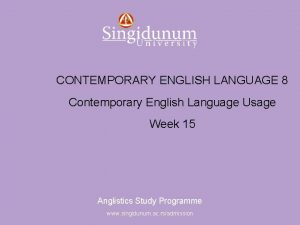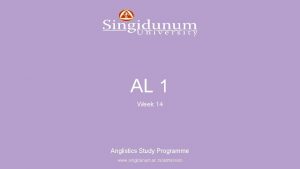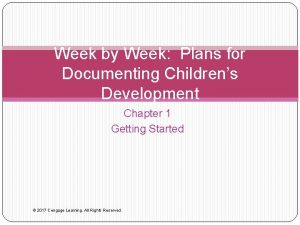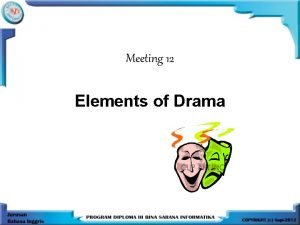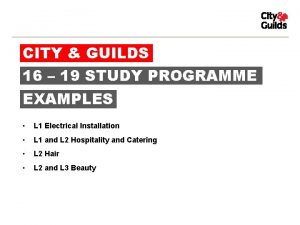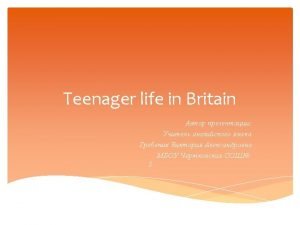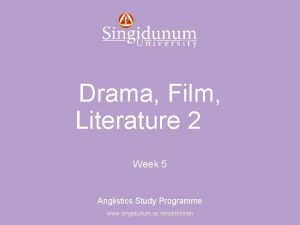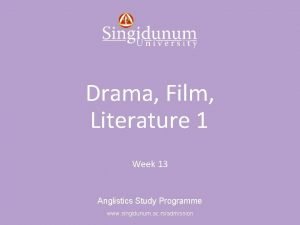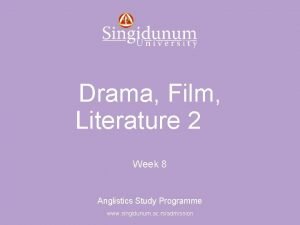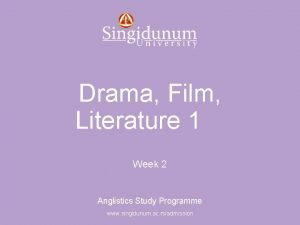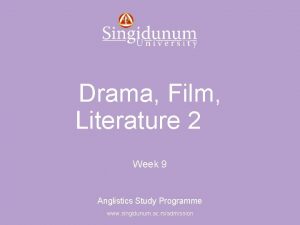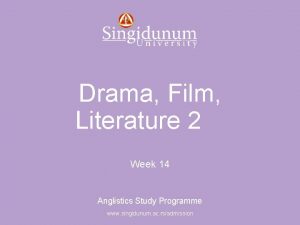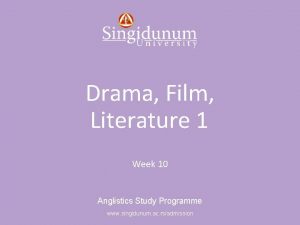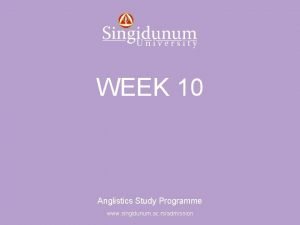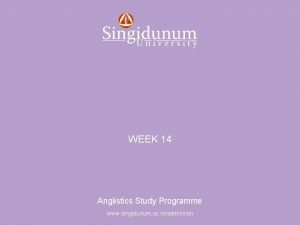Anglistics Study Programme Drama Film Literature 2 Week











- Slides: 11

Anglistics Study Programme Drama, Film, Literature 2 Week 7 Anglistics Study Programme www. singidunum. ac. rs/admission

Anglistics Study Programme Humanism and Renaissance • humanism as the major intellectual movement of the Renaissance began in the late 14 th century in Italy, came to maturity in the 15 th century and then spread to the rest of Europe • by the end of the Middle Ages, an increased interest in ancient cultural heritage was present; • scholars were no longer satisfied with studying theology, but became interested in the thoughts and art of the ancient Greeks and Romans • this shift from religious mysticism towards optimism of the ancient cultural heritage brought to the new interest in material world surrounding the man – this interest reflects the spirit of the Renaissance (the overall rebirth of the European societies that flourished between 14 th and 16 th centuries)

Anglistics Study Programme • artists got a new position in society – they became respected (no longer anonymous like in the previous period) • the Renaissance was possible due to the economic prosperity of the cities (first in Italy and then elsewhere) • the thought, released from the religious constraints, commences a journey into exploring intellectual horizons • all forms of art celebrated man and nature • people were no longer willing to suffer social injustice and hope for a reward in the afterlife. • this period gave some of the greatest minds and artists of all time (da Vinci, Michelangelo, Shakespeare, etc. )

Anglistics Study Programme England of the period • the end of the feudalism; strengthening of domestic and foreign trade • the bourgeoisie became stronger • England became a naval power • Henry VIII • conflict with the Roman Catholic Church and proclamation of the Church of England (ordinary citizens no longer respected the clergy; they were no longer keepers of literacy, i. e. books weren’t produced in monasteries any longer) • though he started the reformation of the church, he was not aware of it – he considered himself a true Catholic • Tyndale’s Bible • he was popular with common people, but dealt with those from higher classes who did not support his ideas in the cruelest ways possible

Anglistics Study Programme The English Renaissance • English humanism flourished in two stages: the first was basically an academic movement that had its roots in the 15 th century and culminated in the work of Sir Thomas More, Sir Thomas Elyot, and Roger Ascham; the second is reflected in a poetic revolution led by Sir Philip Sidney and William Shakespeare. • reached its peak during the reign of Elizabeth I and is, therefore, referred to as Elizabethan literature • in Italy art, i. e. painting and sculpture, were prominent during the era. However, in England those visual arts were not as present. The period of Renaissance in England was dominated primarily by drama and poetry

Anglistics Study Programme • prose of the period – translations seem to come first • Tyndale’s Bible • Sir Francis Bacon – a philosopher; wrote in Latin, served as Lord Chancellor of England (the same way More did)

Anglistics Study Programme Sir Thomas More • Sir Thomas More was one of the greatest, if not the greatest English humanists • He was a deeply devoted humanist and catholic. On one hand, he shared the progressive ideas of the era. On the other, he disapproved of the Church reformation and thus came into direct conflict with Henry VIII who had him killed • His most important and imaginative work was Utopia (written in Latin); the term which is in use in today’s literary criticism – marks the whole movement (utopian literature and dystopian literature). This work served as a criticism of contemporary rulers, their reigns, wars, English law and social perils – and all this was presented in the form of the perfect state, an imaginary island with communism (all products were shared according to the needs; all were equal, and there were no wars)

Anglistics Study Programme Poetry of the period • Henry VIII valued art and beautiful • In 1590 s, poetry developed under the patronage of the King • Two important poets of the period: • Sir Thomas Wyatt – influenced by Petrarca (Petrarch); he introduced the form of the sonnet in English literature, as well as the Petrarchan theme – the rejected lover, descriptions of a woman’s beauty, etc. ). He was not a prolific author, but he was significant as an innovator who provided basics for the poets of the later period • Henry Howard, Earl of Surrey – his name in literature is usually associated with Wyatt; he translated Virgil’s Aeneid, using the blank verse; gave the rhyming metre to the sonnet and divided it into quatrains • “Fathers of the English Sonnet”

Anglistics Study Programme Elizabeth I • managed to regain the monarch’s authority among the nobility • her personal influence on development of England was rather significant, and that is why her reign became known as Elizabethan era – this period (second half of the 16 th century) is usually regarded as the height of the English Renaissance. • this period is famous for flourishing of English drama, led by playwrights W. Shakespeare and Christopher Marlowe

Anglistics Study Programme Elizabethan drama • drama was predominant literary form of the period • it saw its best period during the reign of the queen Elizabeth I • earlier drama was characterized by bible stories, mysteries or had a moral attached to it • during the Elizabethan period, drama branched out to political plays, comedy and historical content – it shifted from bible stories and tackled the reality • plays were far more complex, vital and diverse than before this brought new interest for drama in the 16 th century

Anglistics Study Programme Elizabethan theatre • London was the most inviting place for actors to work at, but the acting companies travelled to other parts of England, as well • the story of Elizabethan drama begins not in theatres, but in Inns of Court of London • the stages were set up in the inn-yards • Theatre – the first theatre building in England – it was built outside the city limits, safe from play-hating Council. The other theatres were built afterwards: The Curtain, The Rose, The Swan, The Globe All these playhouses followed the same architectural lines – the inn-yard surrounded by galleries, the stage which jutted out into the audience and itself had, at the back, two or three tiers of galleries
